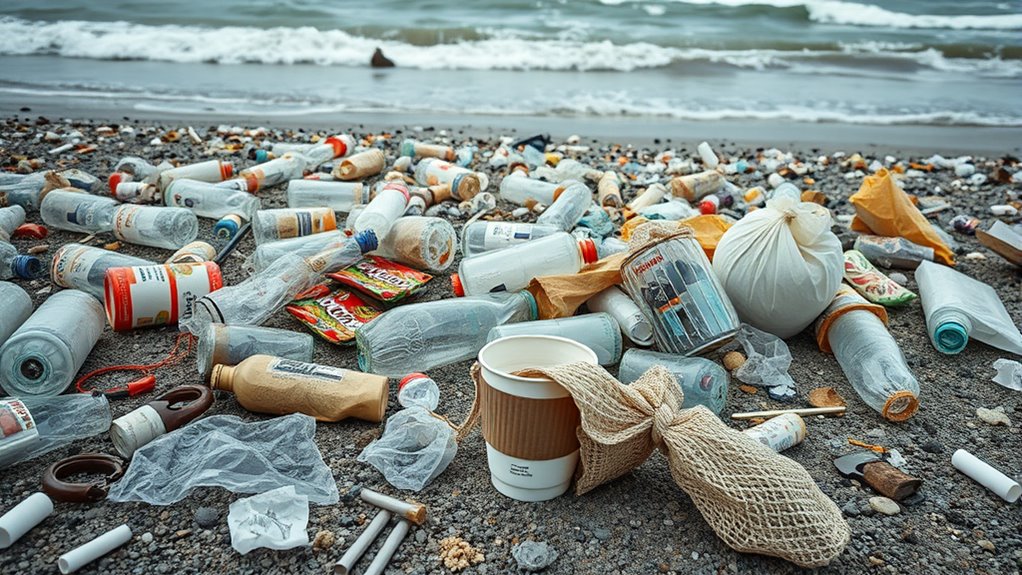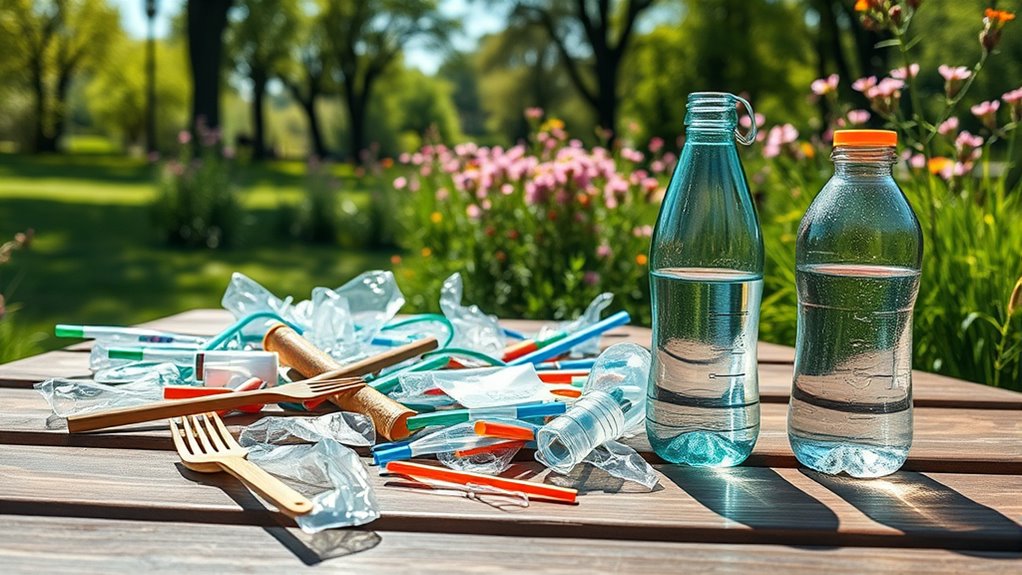Convenience plastics seem harmless but hide significant environmental costs. Their production from fossil fuels emits greenhouse gases and causes habitat destruction, while global shipping ramps up their carbon footprint. These plastics often end up in landfills for hundreds of years, breaking down into microplastics that pollute ecosystems and threaten wildlife. Safer, sustainable options like reusable containers and mindful purchasing reduce this impact. To understand how your choices can protect the planet, explore the full story behind these often unseen consequences.
Key Takeaways
- Plastic production releases greenhouse gases, consumes vast energy, and causes habitat destruction, contributing significantly to climate change.
- Long-distance transportation of plastics increases carbon footprint and reliance on fossil fuels.
- Plastic waste persists for centuries, breaking down into microplastics that pollute ecosystems and harm wildlife.
- Sustainable alternatives like reusable containers and minimal packaging reduce environmental impact and decrease plastic demand.
- Small daily choices, such as using eco-friendly products, can significantly lessen plastic consumption and support a healthier planet.

While convenience plastics make our lives easier, they come with hidden costs that often go unnoticed. Every time you toss a plastic bottle or wrapper into the trash, you’re contributing to a complex web of supply chain impacts that extend far beyond your immediate environment. These plastics are derived from fossil fuels, which require intensive extraction, refining, and transportation— processes that consume vast amounts of energy and release greenhouse gases. As a result, the environmental footprint of producing and distributing these plastics is substantial, adding to climate change and pollution concerns.
Every plastic item we discard fuels fossil fuel extraction, energy use, and environmental harm far beyond our immediate surroundings.
When you choose single-use plastics, you’re not just creating waste; you’re supporting a supply chain that relies on a constant flow of raw materials, often sourced from regions with lax environmental regulations. This extraction can lead to habitat destruction, water contamination, and loss of biodiversity. Once these plastics are manufactured, they are shipped across the globe, often over long distances, increasing their carbon footprint. The logistical network involved in delivering these products is energy-intensive, and the reliance on fossil fuels only exacerbates the environmental costs.
Your convenience comes at a hidden price that impacts ecosystems and communities worldwide. Landfills are overflowing with discarded plastics, many of which take hundreds of years to decompose. During this time, they break down into microplastics, contaminating soil, waterways, and even the food chain. Marine life, in particular, suffers immensely from plastic pollution, ingesting or becoming entangled in debris, which threatens entire species and disrupts marine ecosystems. The environmental footprint of these plastics isn’t just about the materials themselves but also about the long-lasting damage they inflict on our planet.
Fortunately, you have alternatives that are better for the environment and reduce your personal impact. Reusable bags, bottles, and containers made from durable materials like stainless steel, glass, or bamboo can replace countless single-use items. Buying in bulk minimizes packaging waste, and choosing products with minimal or biodegradable packaging cuts down on waste and pollution. Supporting brands committed to sustainable practices encourages a shift in supply chain impacts, prompting manufacturers to adopt greener processes and reduce their environmental footprint.
Every small change you make in your daily routine can considerably lessen the demand for convenience plastics. By opting for sustainable alternatives, you help decrease the extraction of raw materials, lower greenhouse gas emissions, and reduce plastic waste in our environment. Additionally, understanding the importance of climate control can inspire more environmentally conscious choices that mitigate these impacts. While convenience plastics seem to make life simpler, the true cost they impose on our planet is high. Making conscious choices ensures you’re not only benefiting yourself but also contributing to a healthier, more sustainable future for everyone.
Frequently Asked Questions
How Can Consumers Identify Truly Eco-Friendly Plastic Alternatives?
When choosing eco-friendly plastic alternatives, you should look for biodegradable packaging and reusable containers. Check labels for certifications like ASTM D6400 or OK compost, which indicate biodegradability. Avoid single-use plastics and opt for products made from sustainable materials. By reading product info carefully and supporting brands committed to environmental responsibility, you can make smarter choices that reduce plastic waste and promote a healthier planet.
What Are the Economic Impacts of Reducing Plastic Use Globally?
Think of the global economy as a delicate ecosystem. When you reduce plastic use, you spark a market transformation driven by economic incentives for sustainable practices. This shift can lead to job creation in eco-friendly industries and lower environmental cleanup costs. However, it also challenges existing industries, potentially causing short-term economic disruptions. Overall, embracing this change promotes resilience and long-term growth in a greener, more sustainable economy.
How Do Plastics Affect Marine Life Long-Term?
Plastics seriously harm marine life long-term by creating marine debris that pollutes oceans. You might not see it, but this debris causes habitat disruption, making it difficult for creatures to live and reproduce. Over time, plastics break down into tiny particles ingested by marine animals, impacting their health and reproductive success. If you don’t reduce plastic waste, these harmful effects will continue, disrupting ecosystems and threatening marine biodiversity.
Are There Government Policies That Effectively Limit Plastic Waste?
Imagine a clear stream, now murky with plastic waste—you wonder if governments have policies to clear it. Regulatory policies and industry standards aim to limit plastic waste, enforcing bans and encouraging alternatives. Some countries lead with strict bans on single-use plastics, promoting recycling programs. While these policies help, enforcement varies. You can support change by advocating for stronger regulations and sustainable industry standards to protect our environment.
What Are Innovative Recycling Technologies on the Horizon?
You’ll find that innovative recycling technologies are advancing rapidly. Biodegradable plastics are becoming more common, reducing long-term waste, while new recycling innovations, like chemical recycling, break plastics down to their original monomers for reuse. These technologies aim to improve efficiency and sustainability, helping you reduce your plastic footprint. As these solutions develop, they promise a future where plastic waste is minimized, and recycling becomes more effective and eco-friendly.
Conclusion
While switching to alternative options might seem inconvenient at first, the true cost of plastics—pollution, health risks, and environmental damage—far outweighs any hassle. Choosing reusable bags, bottles, or containers isn’t just easier on the planet; it’s easier on you too. So, don’t let the fear of change hold you back. Embrace these simple swaps today. After all, a small effort now can lead to a cleaner, healthier future for everyone.









